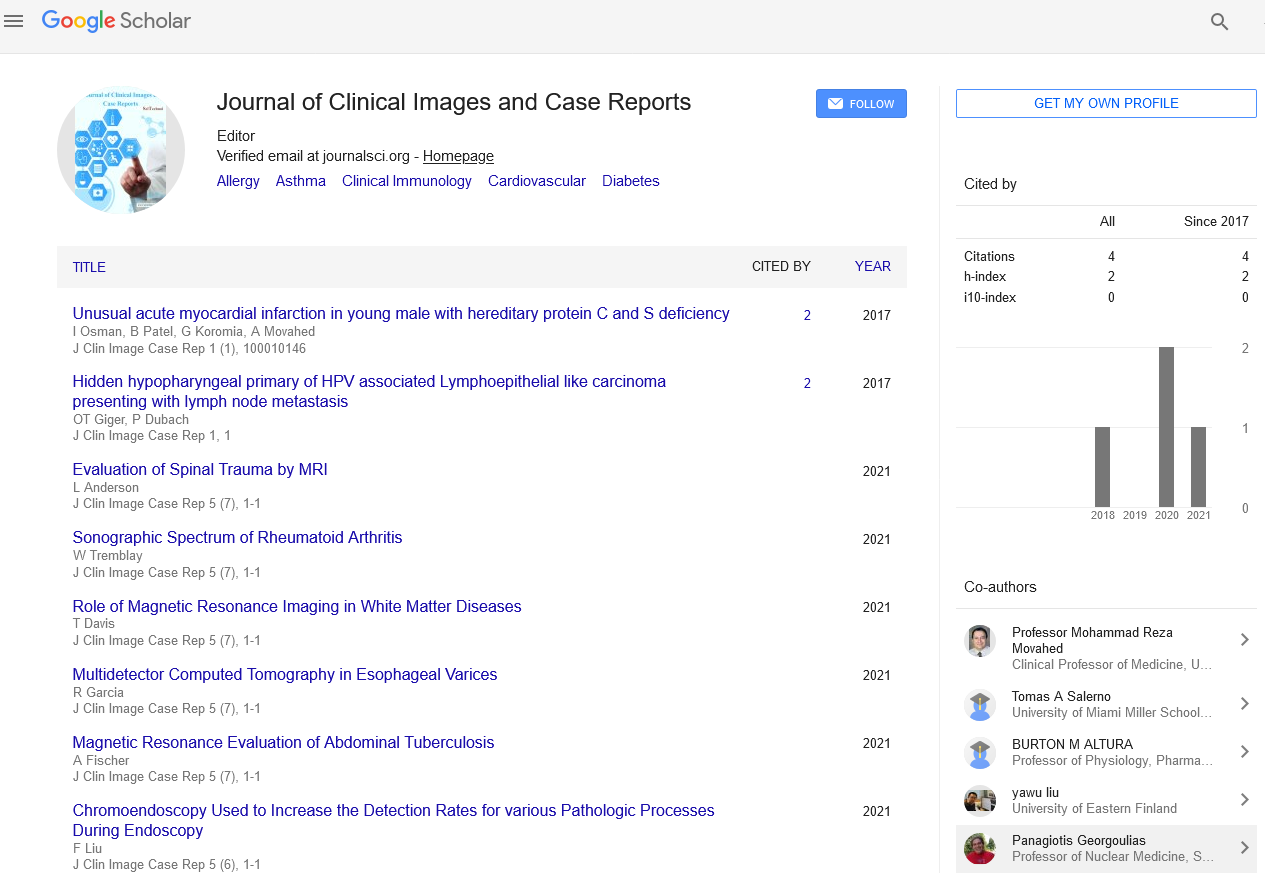Commentary, J Clin Image Case Rep Vol: 8 Issue: 4
The Impact of Fecal Microbiota Transplantation on Gut-Brain Axis Disorders
Benard Haens*
1Department of Gastroenterology and Hepatology, University of Amsterdam, Amsterdam, The Netherlands
*Corresponding Author: Benard Haens,
Department of Gastroenterology and
Hepatology, University of Amsterdam, Amsterdam, The Netherlands
E-mail: haensbenard@gmail.com
Received date: 22 July, 2024, Manuscript No. CICR-24-150622;
Editor assigned date: 24 July, 2024, PreQC No. CICR-24-150622 (PQ);
Reviewed date: 07 August, 2024, QC No. CICR-24-150622;
Revised date: 14 August, 2024, Manuscript No. CICR-24-150622 (R);
Published date: 21 August, 2024, DOI: 10.4172/CICR.1000321
Citation: Haens B (2024) The Impact of Fecal Microbiota Transplantation on Gut-Brain Axis Disorders. J Clin Image Case Rep 8:4.
Description
The Gut-Brain Axis (GBA) refers to the complex communication network that connects the Gastrointestinal (GI) tract and the brain, encompassing neural, hormonal and immunological pathways. This bi-directional communication highlights the significant role of the gut microbiome in influencing not only digestive health but also mental health and cognitive functions. Increasing evidence suggests that imbalances in gut microbiota may contribute to various gut-brain axis disorders, such as anxiety, depression, autism spectrum disorders and neurodegenerative diseases. Fecal Microbiota Transplantation (FMT) has emerged as a potential therapeutic strategy for restoring microbial balance in the gut, leading to improvements in both gut and brain health. This article delves into the impact of FMT on gut-brain axis disorders, focusing on its mechanisms of action and clinical implications.
Understanding fecal microbiota transplantation
Fecal microbiota transplantation involves the transfer of fecal material from a healthy donor into the gastrointestinal tract of a recipient. This procedure aims to restore the diversity and composition of gut microbiota, particularly in patients with dysbiosis, which is an imbalance of microbial communities associated with various health issues. FMT has gained recognition primarily for its effectiveness in treating recurrent Clostridium difficile infections, but its potential extends far beyond this application.
The success of FMT can be attributed to several mechanisms that highlight the relationship between the gut microbiome and the brain. One key mechanism involves the production of Short-Chain Fatty Acids (SCFAs) by gut bacteria during the fermentation of dietary fibers. SCFAs, such as butyrate, acetate and propionate, play an important role in maintaining gut barrier integrity, regulating immune responses and influencing neurotransmitter production. For example, butyrate has been shown to promote the production of serotonin, a neurotransmitter that plays a vital role in mood regulation.
Additionally, the gut microbiota can modulate systemic inflammation, which has been implicated in various neuropsychiatric disorders. An imbalance in gut bacteria can lead to increased intestinal permeability (often referred to as “leaky gut”), allowing proinflammatory cytokines to enter the bloodstream and reach the brain. This can contribute to neuroinflammation and has been linked to conditions such as depression and anxiety. By restoring microbial balance through FMT, it may be possible to reduce systemic inflammation and improve mental health outcomes.
Clinical implications of fecal microbiota transplantation
Emerging studies have begun to examine the clinical implications of FMT in the context of gut-brain axis disorders. A growing body of research suggests that FMT may be beneficial for individuals with conditions such as depression, anxiety, autism spectrum disorders and neurodegenerative diseases like Parkinson’s and Alzheimer’s.
Several studies have indicated that individuals with depression and anxiety often exhibit distinct gut microbiota profiles compared to healthy individuals. FMT has shown promise in preliminary trials, with some studies reporting significant improvements in depressive symptoms following transplantation. For instance, a clinical trial involving patients with major depressive disorder demonstrated that FMT led to reduced depressive symptoms and improved quality of life. These findings suggest that targeting gut dysbiosis through FMT could provide a novel approach to managing mood disorders.
Research has also explored the potential of FMT in children with ASD, who frequently experience gastrointestinal issues alongside behavioral symptoms. Initial findings suggest that FMT may help improve gastrointestinal health and potentially lead to positive changes in behavior and social interactions. While more research is needed, these results confirm the importance of the gut-brain connection in ASD and the potential therapeutic role of FMT.
The role of the gut microbiome in neurodegenerative diseases, such as Parkinson’s and Alzheimer’s, is an area of active research. Studies have shown alterations in gut microbiota composition in patients with these conditions, raising the possibility that FMT may help modulate disease progression or symptoms. For example, animal studies have demonstrated that FMT from healthy mice to those with neurodegenerative conditions can improve motor functions and reduce neuroinflammation, providing a rationale for further investigation in human clinical trials.
Despite the promising results, it is essential to approach FMT with caution. The procedure is not without risks, including the potential transmission of infectious agents and adverse reactions. Additionally, the long-term effects of FMT on gut health and mental health remain uncertain. As the field continues to evolve, standardized protocols for donor selection, fecal processing and recipient screening will be important in ensuring the safety and efficacy of FMT.
Fecal microbiota transplantation represents a novel therapeutic strategy for addressing gut-brain axis disorders. By restoring microbial balance in the gut, FMT may exert beneficial effects on mental health and cognitive functions through various mechanisms, including the production of SCFAs and modulation of inflammation. As research in this area continues to expand, FMT holds the potential to revolutionize the management of gut-brain axis disorders and enhance our understanding of the intricate relationship between the gut microbiome and brain health.
 Spanish
Spanish  Chinese
Chinese  Russian
Russian  German
German  French
French  Japanese
Japanese  Portuguese
Portuguese  Hindi
Hindi 